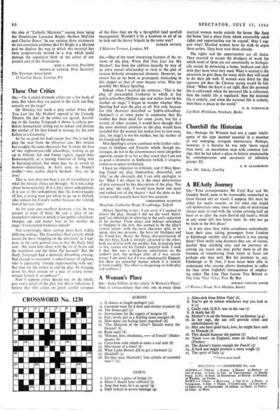$112,—One of the more interesting features of the re- views
of my play, When Did You Last See My Mother?, has been the addition (usually by way of an extra sexual relationship or two) to the plot of various hitherto unsuspected elements. However, no review has so far been as grotesquely misleading in this respect as that of your theatre critic, Miss (or possibly Mr) Hilary Spurling.
Indeed, when I reached the sentence: 'This is the play of unexampled frankness in which at last public-schoolboy-Oedipus ups and makes love to his mother on stage,' I began to wonder whether Miss Spurling had seen the play at all. Not only because Ian (the character described as 'public-schoolboy- Oedipus') is at some pains to emphasise that his mother has been dead for some years, but for a variety of other reasons, I would have thought that the most minimal attention to the play would have revealed that the woman Ian makes love to (not even, alas, 'on stage') is not his mother, but the mother of his friend and flat-mate.
Miss Spurling's review continues with further refer- ences to Oedipus and Eteocles which, though pic- turesque, do not in the circumstances seem altogether apposite, except in so far as they assert that I am not as good a dramatist as Sophocles (which, I imagine, comes as no great revelation).
I have no objection to criticism, and if Miss Spur- ting found my play humourless, distasteful, and 'silly,' as she obviously did, I can only apologise to her. What I do object to is the sheer deformation of plot conveyed by her description of the play. 'For two pins,' she ends, 'I would have burst into tears and rushed out of the theatre'—had she done so her review could scarcely have been less accurate.
CHRISTOPHER HAMPTON Meadside, Catherine Road, Woodbridge, Suffolk
[Hilary Spurling writes: I am sorry if I seemed to distort the play, though I did use the word 'surro- gate' (or substitute) in referring to the son's seduction of his mother. From direct and indirect references to Oedipus in the text, this seemed to be the play's c:ntral action—with the main character split, so to speak, into two persons : the hero (or Oedipus) and his friend Ian. Hence the flimsy characterisation of the two boys. Each is strongly attracted to the other, both are in love with the mother; Ian, in making love to her, carries out his friend's unstated wish. I took it that this was a deliberate substitution on the author's part, but perhaps after all it was uncon- scious. I am sorry too if I was unnecessarily flippant, but these are powerful themes which it is unwise to treat crudely. The effect is cheapening on both play arid audience.)






























 Previous page
Previous page